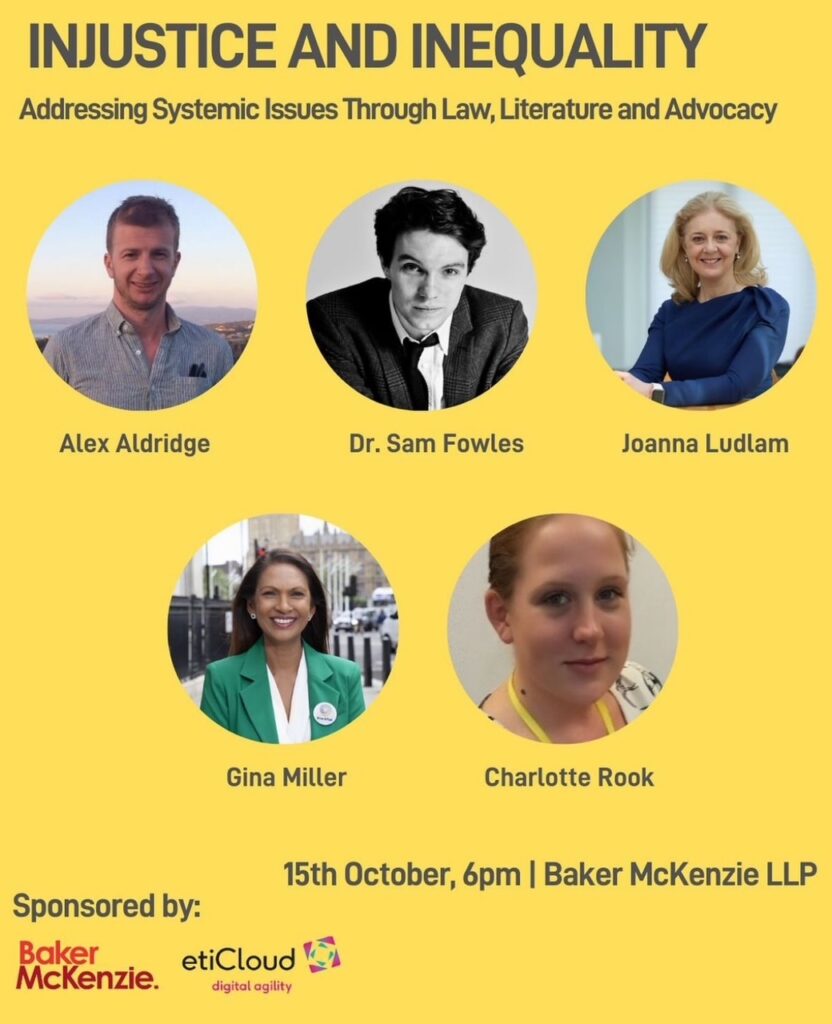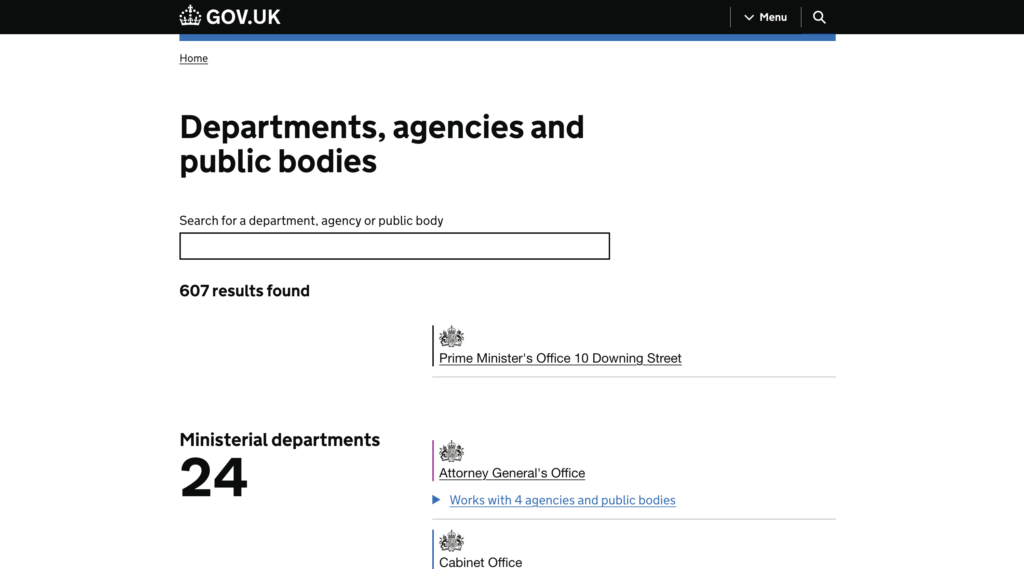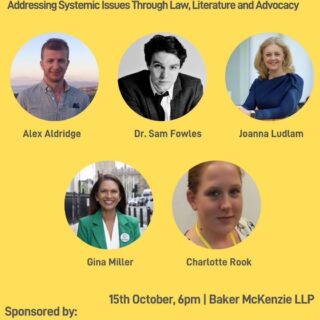I had the privilege of attending the event “Inequality and Injustice: Addressing Systemic Issues Through Law, Literature, and Advocacy” held at the Baker McKenzie offices and hosted by Support Through Court – a charity dedicated to assisting individuals who have no option but to represent themselves in court.
The Panelists and their backgrounds

The panel was moderated by Alex Aldridge, founder of Legal Cheek, the most widely read legal website in the United Kingdom, according to their site. Alex facilitated a meaningful discussion, asking critical questions about systemic issues in the legal field and encouraging panelists to explore the origins of these issues and potential solutions. The panel included four additional members who contributed diverse perspectives.
The first panelist was Dr. Sam Fowles, a barrister and lecturer at St. Edmund Hall, University of Oxford. He is also the Director of a think tank focused on constitutional and democratic research. Additionally, Dr. Fowler is the author of the bestselling book Overruled: Our Vanishing Democracy in Eight Cases.
Seated to his right was Joanna Ludlum, a partner at Baker McKenzie with extensive experience in complex corporate cases and public law litigation. In addition to her corporate work, she is dedicated to pro bono service, including leading a team that represented the UNHCR in challenging the legality of the UK’s Migration and Economic Development Partnership with Rwanda. A strong advocate for diversity, equity, and inclusion, Joanna also co-leads the BakerWomen initiative at the firm.
Another panelist was Gina Miller, an alumna of City, University of London. Gina is a businesswoman, philanthropist, activist, and founder of the True and Fair Party. She shared her personal journey as a survivor of domestic abuse and spoke about her advocacy for other survivors. In addition, Gina champions causes such as ending modern-day slavery, promoting political transparency, and pursuing pension reform.
Charlotte Rook, was the panelist representing Support Through Court as Head of Services. Charlotte offered valuable insights into the organisation’s work and its impact on addressing systemic issues within the legal system.
Key takeaways from the discussion
The discussion began with a broad and challenging question: how can we address systemic issues within the legal system?
Dr. Sam Fowler spoke first, highlighting one of the strengths of the law – the idea that “the courtroom is a great equalizer” – applying equally to all, whether “king or beggar.” Alex followed up by questioning whether this ideal still holds true given the severe underfunding of the justice system, which can hinder access to justice. Sam acknowledged this challenge, stating that “intersectionality is the answer” and emphasising that the funding shortfall is a “failure by politicians, not lawyers.” He concluded by stressing the importance of lawyers advocating for greater attention and resources for the justice system. Joanna also underscored the critical role of pro bono work in addressing these issues.
The next question posed was, “What is the source of injustice?” Sam argued that the “root of injustice is disparities of power,” a point that both Joanna and Gina also agreed with. Gina further emphasized that political corruption is another significant source of injustice, adding that the government must do more to pass legislation that will protect more people and create a fairer society overall. Charlotte expanded on the idea, stating that “injustice is systemic, but it is also situational.” She explained that while injustice is deeply rooted in social institutions, it can manifest differently depending on the specific circumstances of each case. Charlotte shared examples from her work with Support Through Court to illustrate how injustice can vary in different situations.

The panel also discussed the challenges lawyers face when consulting with the government, a point I have heard echoed by other academics who have worked with government bodies. The process of drafting legislation is often lengthy, yet it frequently leads to little or no meaningful change. Lawyers and academics are typically only in an advisory role, and due to systemic injustice, their recommendations are often ignored, preventing progress. The panel emphasized the need for lawyers to take a more active role in driving reform to ensure that their expertise leads to tangible advancements in the legal system.

The panel went on to cover the integration of Artificial Intelligence (AI) into the legal field and its potential implications for legal systems. It was pointed out that “the government uses AI much more than is publicly acknowledged,” which sparked a broader conversation about political transparency and the necessity of greater openness in this rapidly evolving technological landscape.
Gina emphasised, “If we don’t know the information, we cannot challenge it,” highlighting concerns that while governments and firms are increasingly using AI tools, it is often unclear where AI systems source their data. This lack of transparency is a concerning issue, as it could lead to injustice, particularly given the speed at which AI is advancing—outpacing our ability to fully understand or regulate its impact.
The discussion opened to audience questions; an attendee asked whether we should have faith in the new Labour government’s approach to reforming the justice system, given that Prime Minister Keir Starmer once led the Crown Prosecution Service. Gina responded that, while she wished this were true, “he is a politician now,” and noted that reforming the justice system is not typically a popular public issue.
My takeaway
I felt incredibly privileged to attend a panel that provided valuable insights into the causes of inequality and injustice, along with potential solutions. The discussion also explored technological advancements and their potential impact on the legal field and justice more broadly. While this aspect of the conversation was daunting, it is crucial to address, as it will undoubtedly affect my generation of aspiring lawyers.
As someone passionate about film and media, I found it particularly engaging when the panelists discussed the role of film and television. They all agreed that these mediums should not be underestimated, as they have the power to reach a wide audience and shape public perceptions of justice and its proper administration. I must admit, however, that I was expecting more conversation on this topic, and literature was notably absent from the discussion. Nevertheless, hearing such esteemed legal minds thoughtfully and concisely tackle these complex questions was both inspiring and thought-provoking.

The cost of each ticket contributed to providing one session of support through Support Through Court for individuals facing the challenge of representing themselves in court. As a charity, it was encouraging to see such a large turnout, knowing that it will directly help those in need.
Yasmin Traynor is currently in the final year of her law degree at City, University of London. She has a keen interest in both criminal and media law and hopes to study at the bar, as she is interested in advocacy. Outside of academia, she has a passion for film and travel. Her favorite film is ‘One Flew Over the Cuckoo’s Nest,’ and her favourite city she has visited is Hoi An, Vietnam.

